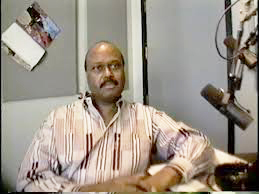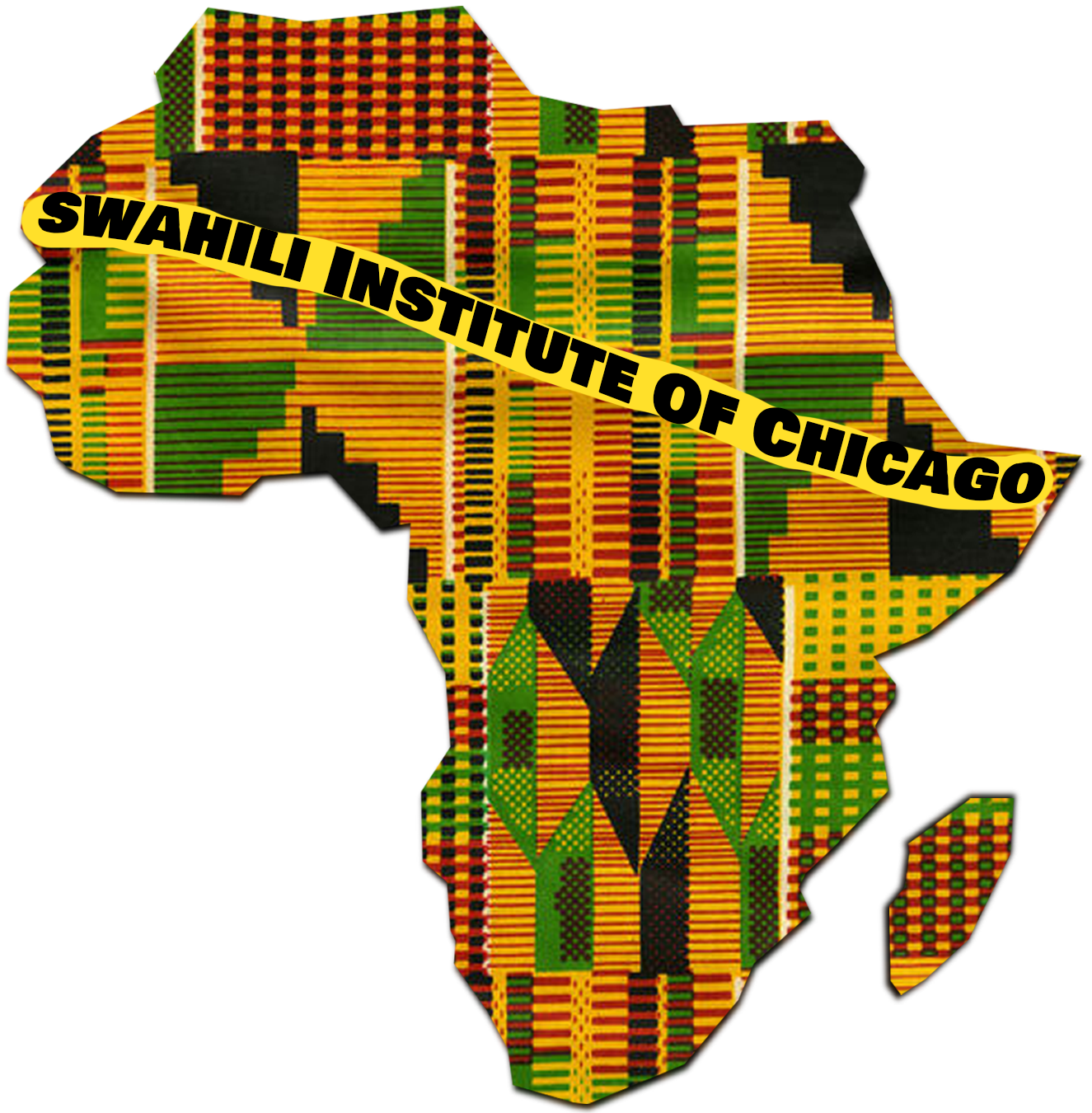SWAHILI INSTITUTE OF CHICAGO
(773) 746-2367Our Mission

The Swahili Institute of Chicago was establised to promote the language of Kiswahili (Swahili), African Culture and History by providing courses, sevices, products and resources to achieve wider access to and understanding of this major African language.

The Swahili Institute of Chicago (SWITCH) was established as a not-for-profit organization in 1988 by it's Founder, Baba Simba Tayari. SWITCH has offered Kiswahili instructions, services and cultural activities to a wide range of clients over several decades. These include students from preschool through college, public and private organizations, as well as local and national entities. This experience has allowed us to expose a significant number of children and adults to African language and culture. Below is a list of benefits that we have observed the students or participants realize from being engaged in our programs and events.
• A world language competency
• Improved respect for self, peers and elders
• Improved understanding and appreciation of their ancestors
• Mental and spirituals connectedness to Africa and the diaspora
• Better understanding of their history and themselves in that process
• Importance of character development and spiritual values in balance to materialism
• A heightened sense of personal accountability and group responsibility to the community
• Understanding the role of age groups, rites of passage and the stages of human development
• An understanding of behavioral models reflective of African traditions as opposed to European
• Tie-ins to other subjects such a language structure, math, geography and history
• Active participation in cultural activities such as singing, dancing, drumming
• More knowledge and appreciation of other cultures and ethnic groups
• Attendance at more cultural events and establishments such as festivals, shops or restaurants
SWITCH hopes you will join us soon in a class, a Swahili night, a drum circle or other activity. Please expose your children to an African language. Making it a family affair is really impactful because members integrate the language into their daily activities. Feel free to contact us for any questions you may have regarding our programs and services.
The Swahili Institute of Chicago (SWITCH) has served a wide range of clients since its inception. Clients include educational institutions, hospitals, social and private entities, government agencies, corporations and individuals. Services offered include language classes and tutorial instruction, translation and interpretive services, cultural presentations, travel consultations and drum circles. Following is a partial list of clients the institute has been able to serve over the years:
SWAHILI INSTITUTE OF CHICAGO
Partial Listing Of Clients Served
Chicago State University
Adults/Children
DuSable Museum of African American History
Adults/Children
Field Museum of Natural History
Adults/Children
Illinois Math & Science Academy
Children
Bryn Mawr Elementary School
Teachers/Children
Chicago Vocational High School
Youth
Simeon High School
Youth
Northern Illinois University
Adults
University of Illinois
Adults
Bobby E. Wright Behavioral Health Center
Adults/Children
Pan African Christian Exchange (PACE)
Adults/Children
Pan African Pen Pal Association (PAPA)
Adults/Youth
Heritage Books and Music
Adults/Children
African American Images
Children
African Festival of the Arts
Adults/Children
West Pullman Elementary School
Children
Pan African Peoples Organization (PAPO)
Adults/Children
McCanns Day Care Center
Children
Morton Salt
Adults
South Shore YMCA
Adults
South Shore Cultural Center
Adults/Children
Michael Jordan Foundation
Adults/Children
Illinois Coalition for Immigration & Refugee Rights
Adults
Randolph Elementary School
Adults/Children
Chicago Public Library
Children
Gresham Elementary School
Children
Universal Language Services (N.Y.)
Adults
Thomas Hoyne Elementary School
Teachers/Children
Afriware Books (Oak Park)
Adults/Children
Horace Man School (Oak Park)
Teachers/Children
Northeastern Illinois University
Teachers
Kennedy King College
Adults/Children
Malcolm X College
Adults/Children
Truman College
Adults
Illinois Language Services
Adults/Children
Annie B Jones Civic Arts Center
Adults/Youth
Lurie Children’s Hospital
Adults/Children
Chicago Cultural Alliance
Adults/Children
United African Organization (UAO)
Adults/Children
Institute of Health Sciences Academy
Adults/Youth
Southwest Chicago Christian Academy
Teachers/Children
Global Girls, Inc.
Adults/Children
Monarch Awards, Inc.
Adults/Children
Jahn Elementary School of Fine Art
Adults/Children
AAA Language Solutions, LLC
Adults
Park Manor Christian Church
Children
University of Illinois Chicago
Students
Vitamin Angels (Walgreens)
Adults/Children
Blacks in Green Organization
Adults/Children
ABLA Homes
Adults/Children
Fellowship Missionary Baptist Church
Children
LAUNCH OF SWAHILI AS THE OFFICIAL DIASPORA LANGUAGE
Via Zoom October 8, 2021
The Swahili Institute of Chicago (SWITCH) is pleased and excited about the upcoming “Launch of Swahili as the Official Diaspora Language” by the African Diaspora Development Institute (ADDI) in collaboration with the Swahili Cultural Institute and the Global Diaspora One Voice Consortium (GDDF). The host of this Zoom launch is H.E. Ambassador, Arikana Chihombori Quao, who is widely admired and respected advocate for African unity and power.
It has been a basic belief of SWITCH from its inception, that Kiswahili is the strongest candidate to become the Pan African language for the continent. The African Academy of Languages (ACALAN), established by the African Union with headquarters in Bamako, Mali, confirms this central role of Kiswahili in visions of unification of the continent and its people. Kiswahili is easily the most recognized African language in the U.S.A. This is especially true, but not exclusively, because of the Matunda ya KWANZAA celebrations and observances that have been growing since its inception in 1966 and which use Kiswahili words for all its concepts, principles and symbols.
SWITCH’s belief has been that the proliferation and adoption of Kiswahili in the U.S.A. and other areas of the diaspora would hasten the adoption of this unifying language on the continent. The KWANZAA celebration has been gaining observers throughout the diaspora in recent years and there is no reason to believe this trend will not continue.
The Swahili Institute of Chicago (SWITCH) looks forward to working with the launchers of this initiative in any conceivable manner. We have been working in the diaspora since our establishment in 1988 and have a large resource of Swahili language materials and a wide range of clients that includes schools, social organizations, grass roots organizations, government agencies, and private companies, as well as religious and cultural institutions. It is our sincere hope that this initiative will be the longed for and over-due spark that leads to a substantial leap toward our overall goal for this Pan African language and African people at home and throughout the diaspora. As the late great Mwalimu Julius Kabarage Nyerere said, “It can be done, play your part.”
Bring Equity and Inclusion for Less Commonly Taught Languages (LCTL) in Chicago Public Schools
Chicago Public Schools (CPS) high school graduation policy requires a minimum of two years of World Language (2yWL) study in high school. However, this policy coupled with the CPS policy on not giving credits for outside courses, puts students who wish to learn a family heritage or culturally significant language that they may wish to learn during their high school years at a disadvantage if it is not offered at their school. Starting in 2028-2029, the Illinois State Board of Education (ISBE) will adopt a similar policy. However, ISBE gives more options in meeting World Language (WL) requirements for graduation to include Less Commonly Taught Languages (LCTL). ISBE allows Ethnic School’s language course work for WL credits and considers the State Seal of Biliteracy as meeting the 2yWL two-year graduation requirement.
For equity and inclusion of LCTL and the very diverse population of Chicago, CPS should enhance its policy as per ISBE to count the State Seal of Biliteracy for meeting the 2yWL requirement. Additionally, as required by ISBE, CPS should create a way for Alternative Evidence (Portfolio) Method to include course work done in Ethnic Schools to qualify for State Seal of Biliteracy, if no approved standard testing is available in the targeted language.
This would ensure every student can meet WL graduation requirements while learning the languages that are important to them and not just the ones offered at their school. No CPS policy or combination of policies should stop students from graduating high school by imposing languages of the district’s choices on students by restricting ISBE’s alternate methods to acquire credits for studying a language not offered at school.
Please sign our petition supporting widening the choices of languages available for students to meet their two year world language requirement for graduation to include Less Commonly Taught Languages, like Kiswahili (Swahili), as explained above.
Here are links for reference and more information:
1. CPS minimum high school graduation requirements
2. ISBE Graduation Requirements
3. CPS new policy gives no Credits towards graduation for courses outside of CPS and Seal of Biliteracy
4. ISBE 2 year World Language Requirement FAQ# 15 Ethnic Schools & #16 State Seal of biliteracy
5. 105 ILCS 5/2-3.159 school code 6. ISBE Portfolio Method for State Seal of Biliteracy 7. University of Illinois Credits for state seal of Biliteracy
SWITCH WORLD KISWAHILI DAY!

The Swahili Institute of Chicago (SWITCH) will officially celebrate World Kiswahili Language Day on July, 7, 2023 at 10707 S. Hale Ave., Chicago, Illinois in the Beverly area. July 7th of every year was established to be a global Kiswahili day by UNESCO Member States on November 24, 2021 at its 41st Session in Paris through Resolution 41/C/61.
If you do not see the .pdf, look in your compute or phone's "Downloads" file.

WVON BROADCAST
Ty Wansley Interview > A Conversation:
Should Swahili Be Offered As A Foreign Language In Chicago Public High Schools, In the 1990's?
wvon-broadcast.mp3
SWAHILI INSTITUTE OF CHICAGO
7356 South Coles Ave. Unit F
Chicago, Illinois 60649






